| Listing 1 - 10 of 10 |
Sort by
|
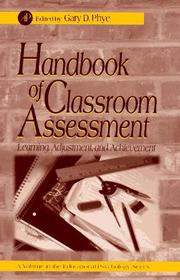
ISBN: 0125541562 9780125541558 0125541554 9780080533025 0080533027 9780125541565 1281046841 9786611046842 9781281046840 6611046844 Year: 1997 Publisher: San Diego : Academic Press,
Abstract | Keywords | Export | Availability | Bookmark
 Loading...
Loading...Choose an application
- Reference Manager
- EndNote
- RefWorks (Direct export to RefWorks)
The Handbook of Classroom Assessment takes a multi-dimensional approach to classroom assessment. A successful combination of theory and practice, the book emphasizes the assessment of classroom learning within content areas and the development of standards for evaluation. Most chapters are devoted to the assessment of learning and achievement and discuss current theories. The book also features assessment of academic self-concept and subjective well-being in children and adolescents. The Handbook provides successfully field-tested examples of assessment techniques and strategies
Academic achievement --- Educational psychology --- Educational tests and measurements --- Learning --- Lerarenopleiding --- algemeen --- algemeen. --- Education --- Psychology, Educational --- Academic underachievement --- Achievement, Academic --- Educational achievement --- Scholastic achievement --- Scholastic success --- School achievement --- Student achievement --- Underachievement, Academic --- Learning process --- Psychology --- Child psychology --- Performance --- Success --- Comprehension --- Academic performance --- Academic progress --- Academic success --- Achievement, Scholastic --- Achievement, Student --- Performance, Academic --- Progress, Academic --- School success (Academic achievement) --- Success, Academic --- Success, School (Academic achievement) --- Success, Scholastic
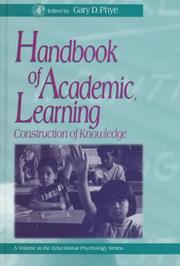
ISBN: 1281033502 9786611033507 0080532934 9780125542555 0125542550 9780080532936 0125542569 9780125542562 6611033505 9781281033505 Year: 1997 Publisher: San Diego : Academic Press,
Abstract | Keywords | Export | Availability | Bookmark
 Loading...
Loading...Choose an application
- Reference Manager
- EndNote
- RefWorks (Direct export to RefWorks)
The Handbook of Academic Learning provides a comprehensive resource for educational and cognitive psychologists, as well as educators themselves, on the mechanisms and processes of academic learning. Beginning with general themes that cross subject and age level, the book discusses what motivates students to learn and how knowledge can be made personal for better learning and remembering. Individual chapters identify proven effective teaching methods for the specific domains of math, reading, writing, science, and critical problem solving, how students learn within those domains, and ho
Constructivism (Education) --- Learning, Psychology of. --- Learning --- Psychology of learning --- Cognitive-developmental theory --- Constructionism (Education) --- Constructivist education --- Piagetian theory of cognitive development --- Psychological aspects --- Educational psychology --- Comprehension --- Learning ability --- Education --- Learning, Psychology of --- Thought and thinking --- Study and teaching

ISBN: 9780125542555 0125542550 9780080532936 0080532934 9786611033507 6611033505 Year: 1997 Publisher: San Diego Academic Press
Abstract | Keywords | Export | Availability | Bookmark
 Loading...
Loading...Choose an application
- Reference Manager
- EndNote
- RefWorks (Direct export to RefWorks)
The Handbook of Academic Learning provides a comprehensive resource for educational and cognitive psychologists, as well as educators themselves, on the mechanisms and processes of academic learning. Beginning with general themes that cross subject and age level, the book discusses what motivates students to learn and how knowledge can be made personal for better learning and remembering. Individual chapters identify proven effective teaching methods for the specific domains of math, reading, writing, science, and critical problem solving, how students learn within those domains, and how learning can be accurately assessed for given domains and age levels. The Handbook takes a constructivist perspective to academic learning, emphasizing the construction of personal knowledge of an academic nature. Constructivism within the context of learning theory is viewed as involving an active learner that constructs an academic knowledge base through the development of cognitive strategies and metacognition. The book discusses the development of basic literacy skills that provide the foundation for higher order thinking and problem solving. Constructivism recognizes the social dimension of classroom learning and emphasizes the motivational elements of self-regulation and volition as essential learner characteristics. Written by authors who have first-hand experience with both theory development and the development of authentic classroom instructional techniques, the Handbook empowers educators to develop, implement, and field-test authentic instructional practices at their school site. The book provides a review of the literature, theory, research, and skill techniques for effective teaching and learning. Key Features * Identifies effective teaching with specific techniques * Covers elementary school through high school * Discusses teaching methods for all main subject areas: reading, writing, math, science, and critical thinking * Identifies how students learn to learn * Reviews theory, research, techniques, and assessment * Contains field tested examples for the educational professional at the school site * Provides a resource for staff development.
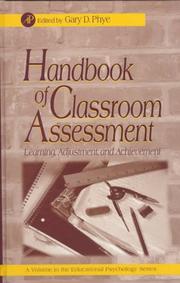
ISBN: 9780125541558 0125541554 9780080533025 0080533027 9780125541565 0125541562 1281046841 9781281046840 9786611046842 6611046844 Year: 1997 Publisher: San Diego Academic Press
Abstract | Keywords | Export | Availability | Bookmark
 Loading...
Loading...Choose an application
- Reference Manager
- EndNote
- RefWorks (Direct export to RefWorks)
The Handbook of Classroom Assessment takes a multi-dimensional approach to classroom assessment. A successful combination of theory and practice, the book emphasizes the assessment of classroom learning within content areas and the development of standards for evaluation. Most chapters are devoted to the assessment of learning and achievement and discuss current theories. The book also features assessment of academic self-concept and subjective well-being in children and adolescents. The Handbook provides successfully field-tested examples of assessment techniques and strategies within the content areas of mathematics, social studies, foreign languages, and the visual arts. Contributing chapter authors share the unique distinction of having backgrounds that include both the development of assessment theory and first hand experience translating theory into practice at the classroom, school site, state, or national level. The book is divided into four sections. Section I discusses the top five theories with respect to what learning is, how it's related to achievement, and how we assess both in the classroom setting. Section II on standardized assessment briefly covers all major standardized achievement tests used in preschool, K-6, and 7-12. Assessment of classroom learning, Section III, presents test instruments and techniques specific to the measurement of math skills, social science skills, and artistic talent across ages and grades. Section IV on classroom practices includes an assessment of general reasoning skills and performance and how to develop a grading philosophy. Key Features * Explains the why, what, and how of classroom assessment * Combines theory and practice for a multidimensional approach to assessment * Presents test instruments and techniques specific to measuring various skills * Uses field-tested examples of assessment techniques * Provides a resource for staff development at the school site.
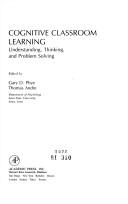
ISBN: 0125542526 Year: 1974 Publisher: Orlando Institute of internal auditors
Abstract | Keywords | Export | Availability | Bookmark
 Loading...
Loading...Choose an application
- Reference Manager
- EndNote
- RefWorks (Direct export to RefWorks)
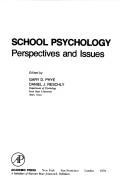
ISBN: 012554250X Year: 1979 Publisher: New York (N.Y.): Academic press
Abstract | Keywords | Export | Availability | Bookmark
 Loading...
Loading...Choose an application
- Reference Manager
- EndNote
- RefWorks (Direct export to RefWorks)
Educational psychology --- Educational tests and measurements --- Exceptional children --- School psychologists --- School psychology --- Psychology, School --- Psychology, Applied --- Psychologists, School --- Psychologists --- Abnormal children --- Atypical children --- Children, Abnormal and backward --- Children, Exceptional --- Children --- Educational assessment --- Educational measurements --- Mental tests --- Tests and measurements in education --- Psychological tests for children --- Psychometrics --- Students --- Examinations --- Psychological tests --- Education --- Psychology, Educational --- Psychology --- Child psychology --- Rating of --- Exceptional children.
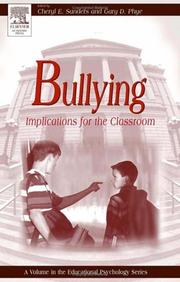
ISBN: 0126179557 9786610927081 0080490581 1280927089 1417556005 9781417556007 9780080490588 1592784852 9781592784851 9780126179552 Year: 2004 Publisher: San Diego : Elsevier/Academic Press,
Abstract | Keywords | Export | Availability | Bookmark
 Loading...
Loading...Choose an application
- Reference Manager
- EndNote
- RefWorks (Direct export to RefWorks)
In recent years there have been an increasing number of incidents where children have either perpetrated or been the victims of violence in the schools. Often times the children who perpetrated the violence had been the victims of school bullying. If bullying once was a matter of extorting lunch money from one's peers, it has since escalated into slander, sexual harassment, and violence. And the victims, unable to find relief, become depressed and/or violent in return.Despite all the media attention on recent school tragedies, many of which can be traced to bullied children, there has
Bullying in schools --- Bullying --- Classroom management --- #PBIB:2004.3 --- School discipline --- School management and organization --- Teaching --- Prevention --- Classroom management. --- Prevention.

ISBN: 1417556005 9781417556007 9780080490588 0080490581 1592784852 9781592784851 9780126179552 0126179557 Year: 2004 Publisher: San Diego, Calif Elsevier/Academic Press
Abstract | Keywords | Export | Availability | Bookmark
 Loading...
Loading...Choose an application
- Reference Manager
- EndNote
- RefWorks (Direct export to RefWorks)
In recent years there have been an increasing number of incidents where children have either perpetrated or been the victims of violence in the schools. Often times the children who perpetrated the violence had been the victims of school bullying. If bullying once was a matter of extorting lunch money from one's peers, it has since escalated into slander, sexual harassment, and violence. And the victims, unable to find relief, become depressed and/or violent in return. Despite all the media attention on recent school tragedies, many of which can be traced to bullied children, there has been little in the way of research-based books toward understanding why and how bullying occurs, the effects on all the individuals involved and the most effective intervention techniques. Summarizing research in education, social, developmental, and counseling psychology, Bullying: Implications for the Classroom examines the personality and background of both those who become bullies and those most likely to become their victims, how families, peers, and schools influence bullying behavior, and the most effective interventions in pre-school, primary and middle schools. Intended for researchers, educators, and professionals in related fields, this book provides an international review of research on bullying. KEY FEATURES: * Presents practical ideas regarding prevention/intervention of bullying * Covers theoretical views of bullying * Provides an international perspective on bullying * Discusses bullying similarities and differences in elementary and middle school * Presents practical ideas regarding prevention/intervention of bullying * Provides an international perspective on bullying * Outlines information regarding bullying during the elementary and middle school years * Covers theoretical views of bullying * Presents new approaches to explaining bullying * Contributing authors include internationally known researchers in the field.
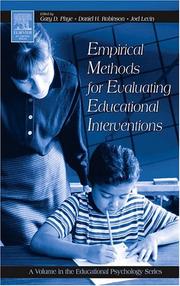
ISBN: 0125542577 9786610630738 1280630736 0080455239 9780080455235 9780125542579 6610630739 Year: 2005 Publisher: San Diego : Elsevier Academic Press,
Abstract | Keywords | Export | Availability | Bookmark
 Loading...
Loading...Choose an application
- Reference Manager
- EndNote
- RefWorks (Direct export to RefWorks)
New US government requirements state that federally funded grants and school programs must prove that they are based on scientifically proved improvements in teaching and learning. All new grants must show they are based on scientifically sound research to be funded, and budgets to schools must likewise show that they are based on scientifically sound research. However, the movement in education over the past several years has been toward qualitative rather than quantitative measures. The new legislation comes at a time when researchers are ill trained to measure results or even to frame quest
Education --- Methodology --- Méthodologie --- Educational evaluation --- Educational productivity --- Educational psychology --- #PBIB:2005.2 --- Children --- Education, Primitive --- Education of children --- Human resource development --- Instruction --- Pedagogy --- Schooling --- Students --- Youth --- Civilization --- Learning and scholarship --- Mental discipline --- Schools --- Teaching --- Training --- Psychology --- Productivity, Educational --- Educational accountability --- Research&delete& --- Educational psychology. --- Research --- Methodology.

ISBN: 0080455239 9780080455235 9780125542579 0125542577 9786610630738 6610630739 Year: 2005 Publisher: San Diego Elsevier Academic Press
Abstract | Keywords | Export | Availability | Bookmark
 Loading...
Loading...Choose an application
- Reference Manager
- EndNote
- RefWorks (Direct export to RefWorks)
Invaluable for all educators and teachers needing to write acceptable grant proposals or to obtain governmental funding for their programs.
| Listing 1 - 10 of 10 |
Sort by
|

 Search
Search Feedback
Feedback About
About Help
Help News
News